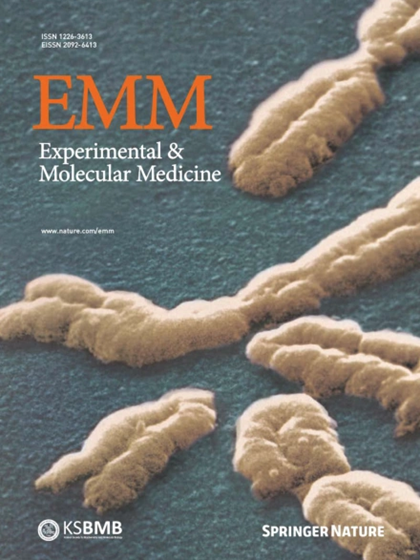Single-cell RNA sequencing reveals transcriptional changes in circulating immune cells from patients with severe asthma induced by biologics
IF 9.5
2区 医学
Q1 BIOCHEMISTRY & MOLECULAR BIOLOGY
引用次数: 0
Abstract
Patients with severe eosinophilic asthma often require systemic medication, including corticosteroids and anti-type 2 (T2) cytokine biologics, to control the disease. While anti-IL5 and anti-IL4Rα antibodies suppress the effects of IL-4, IL-5 and IL-13, the molecular pathways modified by these biologics that are associated with clinical improvement remain unclear. Therefore, we aimed to describe the effects of T2-targeting biologics on the gene expression of blood immune cells. We conducted single-cell RNA sequencing (scRNA-seq) of peripheral blood mononuclear cells (PBMCs) from eight patients with severe eosinophilic asthma treated with mepolizumab, reslizumab, or dupilumab. PBMCs were obtained before the initiation of biologics and at 1- and 6-month timepoints after the initiation of treatment to elucidate treatment-induced changes. During treatment, the proportions of T cells/natural killer (NK) cells, myeloid cells, and B cells did not change. However, the composition of classical monocytes (CMs) changed: IL1B+ CMs were reduced, and S100A+ CMs were increased. The subsets of T cells also changed, and significant downregulation of the NF-κB pathway was observed. The genes related to the NF-κB pathway were suppressed across T/NK, myeloid, and B cells. The transcriptional landscape did not significantly change after the first month of treatment, but marked changes occurred at six-month intervals. In conclusion, regardless of the type of biologics used, suppression of T2-mediated pathways ultimately reduces the expression of genes related to NF-κB signaling in circulating immune cells. Further studies are warranted to identify potential biomarkers related to treatment response and long-term outcomes. Clinical trial registration number: NCT05164939 Severe asthma is a chronic disease where the airways are inflamed, causing breathing issues even with high-dose inhaled corticosteroids. Current treatments, including biologics, help but don’t fully control the disease. Researchers studied how biologics affect immune cells in severe asthma patients. In this study, they analyzed blood samples from eight patients treated with biologics like mepolizumab, reslizumab, and dupilumab. They used single-cell RNA sequencingto examine changes in gene expression in immune cells over six months. The researchers found that biologics reduced inflammation by altering specific immune cell pathways. They observed a decrease in pro-inflammatory genes and an incrḍease in genes related to immune regulation. These changes suggest that biologics help control severe asthma by modifying immune cell behavior. This summary was initially drafted using artificial intelligence, then revised and fact-checked by the author.

单细胞RNA测序揭示了生物制剂诱导的严重哮喘患者循环免疫细胞的转录变化。
严重嗜酸性粒细胞哮喘患者通常需要全身药物治疗,包括皮质类固醇和抗2型(T2)细胞因子生物制剂,以控制疾病。虽然抗IL-5和抗il - 4r α抗体抑制IL-4、IL-5和IL-13的作用,但这些生物制剂修饰的与临床改善相关的分子途径尚不清楚。因此,我们旨在描述t2靶向生物制剂对血液免疫细胞基因表达的影响。我们对8例接受mepolizumab、reslizumab或dupilumab治疗的严重嗜酸性哮喘患者的外周血单个核细胞(PBMCs)进行了单细胞RNA测序(scRNA-seq)。在生物制剂开始前和治疗开始后1个月和6个月的时间点获得pbmc,以阐明治疗引起的变化。在治疗期间,T细胞/自然杀伤(NK)细胞、骨髓细胞和B细胞的比例没有变化。然而,经典单核细胞(classic monocytes, CMs)的组成发生了变化:IL1B+ CMs减少,S100A+ CMs增加。T细胞亚群也发生变化,NF-κB通路明显下调。与NF-κB通路相关的基因在T/NK细胞、髓细胞和B细胞中均被抑制。在第一个月的治疗后,转录格局没有明显的变化,但在六个月的间隔中出现了明显的变化。总之,无论使用何种生物制剂,抑制t2介导的通路最终都会降低循环免疫细胞中NF-κB信号相关基因的表达。有必要进一步研究确定与治疗反应和长期预后相关的潜在生物标志物。临床试验注册号:NCT05164939。
本文章由计算机程序翻译,如有差异,请以英文原文为准。
求助全文
约1分钟内获得全文
求助全文
来源期刊

Experimental and Molecular Medicine
医学-生化与分子生物学
CiteScore
19.50
自引率
0.80%
发文量
166
审稿时长
3 months
期刊介绍:
Experimental & Molecular Medicine (EMM) stands as Korea's pioneering biochemistry journal, established in 1964 and rejuvenated in 1996 as an Open Access, fully peer-reviewed international journal. Dedicated to advancing translational research and showcasing recent breakthroughs in the biomedical realm, EMM invites submissions encompassing genetic, molecular, and cellular studies of human physiology and diseases. Emphasizing the correlation between experimental and translational research and enhanced clinical benefits, the journal actively encourages contributions employing specific molecular tools. Welcoming studies that bridge basic discoveries with clinical relevance, alongside articles demonstrating clear in vivo significance and novelty, Experimental & Molecular Medicine proudly serves as an open-access, online-only repository of cutting-edge medical research.
 求助内容:
求助内容: 应助结果提醒方式:
应助结果提醒方式:


